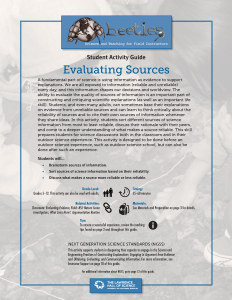A fundamental part of science is using information as evidence to support
explanations. We are all exposed to information (reliable and unreliable)
every day, and this information shapes our decisions and worldview. The
ability to evaluate the quality of sources of information is an important part of constructing and critiquing scientific explanations (as well as an important life skill). Students, and even many adults, can sometimes base their explanations on evidence from unreliable sources and can learn to think critically about the reliability of sources and to cite their own sources of information whenever they share ideas. In this activity, students sort different sources of science information from most to least reliable, discuss their rationale with their peers, and come to a deeper understanding of what makes a source reliable. This skill prepares students for science discussions both in the classroom and in their outdoor science experience. This activity is designed to be done before an outdoor science experience, such as outdoor science school, but can also be done after such an experience.
Students will:
- Brainstorm sources of information.
- Sort sources of science information based on their reliability.
- Discuss what makes a source more reliable or less reliable.

